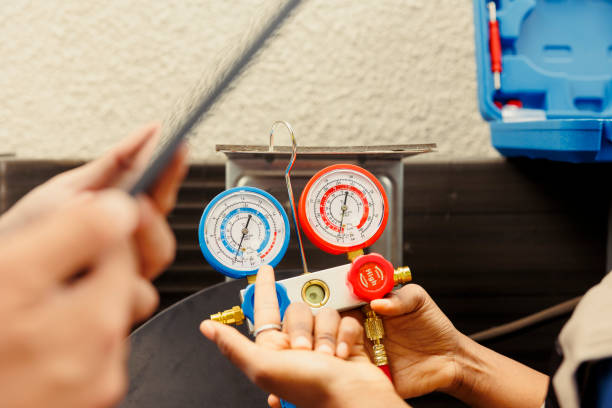An effectively operating air conditioning (AC) system is an essential comfort during the summer’s intense heat. The AC compressor, a vital part that is essential to cooling your living areas, is at the center of this system. Despite their robust architecture, AC compressors are not impervious to deterioration. Taking a proactive approach to maintenance is crucial to avoiding the inconvenience and cost of AC Compressor Replacement. We look at practical maintenance advice in this extensive guide that will help your AC compressor last a lot longer.
Understanding the AC Compressor
Before delving into maintenance strategies, it’s crucial to understand the role of the AC compressor. Your air conditioning system’s workhorse, the compressor, is in charge of pressurizing and circulating refrigerant to speed up the cooling process. The compressor may experience wear and tear from dust, debris, and frequent use over time, which could result in decreased performance and, eventually, the need for replacement.
1. Regular Cleaning of Condenser Coils
The buildup of dirt and debris on the condenser coils is one of the main causes of inefficiency in AC compressors. The exterior unit contains coils that release heat and allow the refrigerant to cool. Regularly cleaning the condenser coils with a gentle brush or low-pressure air can prevent the buildup of grime, ensuring optimal heat exchange and reducing the strain on the compressor.
2. Changing Air Filters
Clean air filters are the unsung heroes of an efficiently running AC system. Clogged filters not only hinder airflow but also force the compressor to work harder, leading to premature wear. Make it a habit to check and replace air filters regularly, usually every one to three months, or as recommended by the manufacturer. This simple task can significantly contribute to the longevity of your AC compressor.
3. Monitoring Refrigerant Levels
An insufficient amount of refrigerant can cause the compressor to overheat, leading to potential damage. Regularly monitoring and maintaining the correct refrigerant levels is crucial for the optimal performance of your AC system. If you suspect a refrigerant leak or inadequate levels, it’s advisable to consult a professional technician to address the issue promptly.
4. Ensuring Proper Airflow
Unobstructed airflow is vital for the efficient operation of the AC compressor. Check the area around the outdoor unit to ensure there are no obstructions, such as tall grass, shrubs, or debris. Additionally, keep indoor vents unblocked to maintain a smooth flow of air. Proper airflow minimizes strain on the compressor and enhances overall system performance.
5. Scheduled Professional Inspections
While some maintenance tasks can be handled by homeowners, scheduling regular professional inspections is essential for a thorough assessment of your AC system. HVAC technicians possess the expertise to identify potential issues early on, preventing them from escalating into major problems that may necessitate compressor replacement. Aim for at least one annual inspection to keep your system in peak condition.
6. Investing in a Surge Protector
Power surges pose a significant risk to electronic components, including the AC compressor. Investing in a surge protector for your HVAC system can safeguard against voltage spikes caused by electrical storms or power fluctuations. This additional layer of protection can prevent compressor damage and extend its operational life.
7. Using a Programmable Thermostat
A programmable thermostat not only enhances energy efficiency but also reduces the workload on the AC compressor. By programming temperature settings to adjust according to your daily routine, you can avoid unnecessary strain on the system. This smart approach helps maintain a comfortable indoor environment without subjecting the compressor to constant demand.
8. Addressing Strange Sounds Promptly
Unusual noises emanating from your AC system, such as grinding, rattling, or hissing, can be early indicators of underlying issues with the compressor. Ignoring these sounds can lead to more significant problems over time. If you notice any abnormal sounds, consult with a professional technician promptly to diagnose and address the issue before it escalates.
9. Protecting the Compressor from Overworking
Avoid overworking your AC system by setting realistic temperature expectations. Forcing the system to maintain extremely low temperatures can strain the compressor and contribute to premature wear. Establish a comfortable temperature that allows the system to operate efficiently without unnecessary stress.
10. Consider Replacement Parts When Necessary
In some cases, specific components within the compressor may require replacement. Rather than waiting for a complete breakdown, address issues such as faulty capacitors or worn-out contactors promptly. Timely replacement of worn parts can prevent further damage to the compressor and extend its overall lifespan.
Conclusion
Your AC compressor is a vital component of your home’s cooling system, and its proper maintenance is crucial for the longevity of your HVAC investment. By adopting a proactive approach to care and following the outlined maintenance tips, you can avoid the inconvenience and expense of AC compressor replacement. Remember, regular attention to your AC system not only ensures a comfortable living environment but also contributes to energy efficiency and cost savings in the long run.
